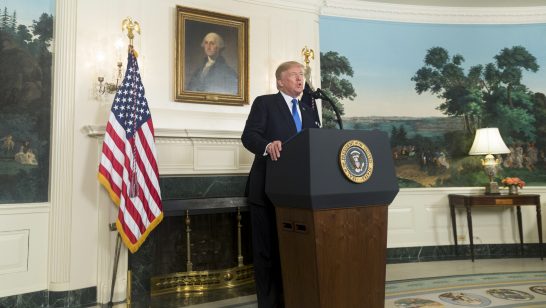
As the quinquennial Review Conference of the Treaty on the Non-proliferation of Nuclear Weapons (NPT) scheduled for the spring of 2015 in New York approaches, it is necessary to be reminded of the critical role of the proposal for convening a Conference on the Middle East Weapons of Mass Destruction Free Zone (MEWMDFZ).
The apparent failure of Finland, the designated host nation and Facilitator for the 2012 conference, to make substantial progress beyond a series of ‘consultations’ has already led to the Egyptian delegation walking out of the Second Session of the Preparatory Committee for the 2015 NPT Review Conference held in Geneva last year. At the Third Session held in New York from 28 April to 9 May 2014 bland statements from the UN Secretary-General and the Facilitator reflected continuing lack of progress. A report from the Stockholm International Peace Research Institute (SIPRI) observer at the meeting refers to the recommendations contained in the Chairman’s Summary produced on his own initiative and with no endorsement by the meeting. This is a weak outcome and there is no gainsaying the fact that absent any significant progress on this issue we are likely to have a failed NPT Review Conference in 2015, with serious consequences for the viability of this unique international legal norm which is also the sole multilateral instrument committing all the nuclear weapon power signatories to nuclear disarmament.
It is now widely acknowledged that the 1995 package of decisions to extend the NPT indefinitely, with a strengthened Review Process and the adoption of Principles and Objectives for Nuclear Non-proliferation and Disarmament, would not have succeeded without the all important Resolution on the Middle East which was negotiated and added to the package in the final stages bringing all the Arab countries on board. Operative paragraph 5 of that Resolution said very clearly that it:
calls upon all states in the Middle East to take practical steps in appropriate forums aimed at making progress towards inter alia the establishment of an effective, verifiable Middle East zone free of weapons of mass destruction (nuclear, chemical and biological) and their delivery systems, and to refrain from taking any measures that preclude the achievement of this objective.
The 2000 NPT Review Conference that followed merely stated that the resolution on the Middle East is “valid until its goals and objectives are achieved.” Worse was to follow. With the neo-conservative policies pursued in the USA by the Bush Administration it was no surprise that the 2005 Review Conference ended with no Final Document, adding to the frustration of the non nuclear weapon states in general and the Arab countries among them in particular.
In 2010 it was clear that the Arab countries (all of them states parties of the NPT) led by Egypt were going to demand some forward movement on the MEWMDFZ at the Review Conference held in New York. The Conference finally endorsed 5 practical steps to make progress towards the goal of establishing a MEWMDFZ which included convening a regional conference to discuss the issue in 2012 and appointing a Facilitator. The steps were set out as follows:
The UNSG and the co-sponsors of the 1995 Resolution, in consultation with the States of the region, will:
• convene a conference in 2012, on the establishment of a ME ZFNW and all other weapons of mass destruction.
• Appoint a facilitator, with a mandate to support implementation of the 1995 Resolution by conducting consultations with the States of the region in that regard and undertaking preparations for the convening of the 2012 Conference; to assist in implementation of follow-on steps agreed by the participating regional States at the 2012 Conference and to report to the 2015 Review Conference and its Preparatory Committee meetings;
• Designate a host Government for the 2012 Conference;
• Take additional steps aimed at supporting the implementation of the 1995 Resolution, including that IAEA, the Organization for the Prohibition of Chemical Weapons and other relevant international organizations be requested to prepare background documentation for the 2012 Conference regarding modalities for a zone free of nuclear weapons and other weapons of mass destruction and their delivery systems, taking into account work previously undertaken and experience gained;
• Take consideration of all offers aimed at supporting the implementation of the1995 Resolution, including the offer of the European Union to host a follow-on seminar to that organized in June 2008.
Eventually Finland was appointed host country for the Conference and Ambassador Jakko Lajjava as the Facilitator.
At the end of 2012, when the Conference promised in the Final Declaration of the NPT Review Conference was supposed to be held, there was an announcement, curiously by the USA alone, that the conference had been postponed. Pugwash said in its statement at the time:
The indefinite postponement of the Helsinki conference would be a very serious setback for all those who are hoping to create a better and more peaceful environment in the Middle East and a de facto reward for all those who have worked to undermine this laudable objective.
This unilateral announcement also represents a serious blow to the credibility of the Nuclear Non-proliferation Treaty (NPT) since the non-discriminatory objective of the conference was contained in the Resolution on the Middle East as an indispensable part of the conclusions of the 1995 Review and Extension Conference without which there would have been no indefinite extension of the NPT. Fifteen years later its inclusion in the Final Document of the NPT Review Conference of 2010 revived the confidence of all the parties to the NPT on the relevance of this vital bulwark against the proliferation of weapons of mass destruction, especially nuclear weapons.
In recent months the Facilitator has convened two rounds of informal consultations among the parties in Switzerland but no details have emerged about any progress. There is little prospect of any forward movement on the MEWMDFZ between now and 2015 given the political stalemate in that region. The US Secretary of State himself has had difficulty in moving his initiative and with the problems in Syria and Egypt, and now in Iraq, there seems to be no conducive climate for any progress. The adverse impact this will have on the NPT Review Conference of 2015 remains to be seen.
The opinions articulated above represent the views of the author(s), and do not necessarily reflect the position of the European Leadership Network or any of its members. The ELN’s aim is to encourage debates that will help develop Europe’s capacity to address the pressing foreign, defence, and security challenges of our time.


